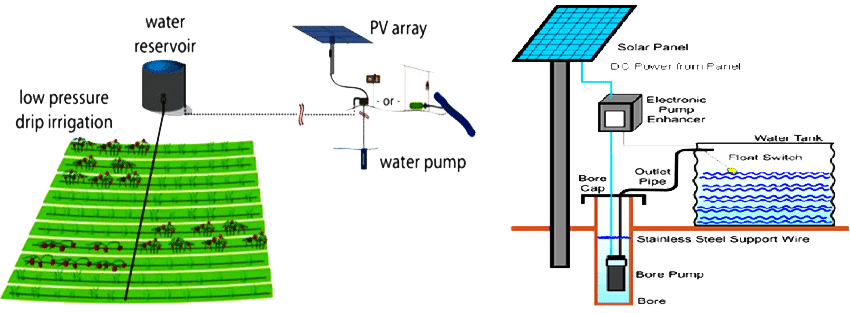Solar Irrigation System
Helping Farmers Use Solar Power for Affordable, Reliable, and Eco-Friendly Irrigation to Build a Greener Futur
The Way We Work
Sustainable Energy Solutions for Modern Agriculture
A solar irrigation system is an innovative and eco-friendly approach to powering agricultural irrigation using solar energy. Instead of relying on costly diesel pumps or unstable grid electricity, solar-powered pumps harness sunlight through photovoltaic panels to draw water from rivers, ponds, or underground sources and distribute it to the fields.
This system is particularly beneficial in countries with abundant sunlight, like Bangladesh, where agriculture is the backbone of the economy. By adopting solar irrigation, farmers can enjoy multiple advantages:
Cost Savings: Eliminates fuel costs and reduces dependency on grid electricity.
Reliability: Provides uninterrupted irrigation even in remote areas with no electricity access.
Sustainability: Reduces carbon emissions and promotes environmentally friendly farming practices.
Long-Term Benefits: Though initial setup costs may be high, maintenance is minimal, and long-term returns are significant.
Solar irrigation not only ensures food security but also helps farmers embrace renewable energy, creating a more resilient and climate-friendly agricultural sector.
Our Solutions
From concept to completion, our solutions are designed to optimize performance, reduce costs, and build a greener future
Importance of Solar System in Irrigation in Agriculture
Solar irrigation plays a vital role in making modern agriculture more productive, sustainable, and affordable. It directly benefits farmers and the environment in several ways:
1. Reduces Cost of Irrigation
Farmers don’t need to spend money on diesel or depend on expensive grid electricity. Once installed, solar systems provide almost free water pumping.
2. Reliable Water Supply
In rural areas where electricity is often unavailable or unstable, solar pumps ensure a steady supply of water for crops throughout the year.
3. Environmental Friendly
Solar energy is clean and renewable. Using it reduces carbon emissions and protects the environment compared to diesel pumps.
4. Supports Food Security
Reliable irrigation means farmers can grow crops in all seasons, leading to increased production and contributing to national food security.
5. Low Maintenance & Long Time Benefits
Solar irrigation systems require little maintenance, last many years, and give farmers long-term savings.
6. Empower Farmers
Farmers become more independent, less vulnerable to fuel price changes, and more resilient against climate change impacts.
7. Reduced Carbon Footprints
SPIS eliminates greenhouse gas emissions. This leads to cleaner air and a smaller agricultural footprint.

